Harnessing the Power of ERP Software: A Comprehensive Guide for Engineering Companies
In the dynamic and ever-evolving landscape of the engineering industry, organizations are constantly seeking ways to streamline operations, enhance efficiency, and gain a competitive edge. Enterprise Resource Planning (ERP) software has emerged as a transformative solution, empowering engineering companies to achieve these objectives and unlock unprecedented growth potential. This comprehensive guide delves into the multifaceted world of ERP software, exploring its core value propositions, key pain points it addresses, and the transformative benefits it can bring to engineering companies.
Unveiling the Value Propositions of ERP Software for Engineering Companies
ERP software serves as a centralized platform that seamlessly integrates various business functions, enabling engineering companies to gain a holistic view of their operations and make informed decisions. Its comprehensive suite of modules encompasses essential aspects such as project management, supply chain management, customer relationship management (CRM), and financial management. By leveraging ERP software, engineering companies can streamline processes, eliminate redundancies, and enhance collaboration across departments, leading to significant improvements in operational efficiency and cost optimization.
Addressing Key Pain Points of Engineering Companies

Engineering companies often grapple with a myriad of challenges that hinder their growth and profitability. ERP software is meticulously designed to alleviate these pain points, providing tailored solutions that empower companies to overcome obstacles and achieve operational excellence.
-
Project Management Bottlenecks: ERP software streamlines project management processes, providing real-time visibility into project status, resource allocation, and task dependencies. This enhanced visibility enables project managers to identify and address potential bottlenecks proactively, ensuring timely project completion and improved resource utilization.
-
Supply Chain Disruptions: Engineering companies rely on a complex network of suppliers and vendors to procure the materials and components necessary for their operations. ERP software integrates supply chain management capabilities, providing a centralized platform for managing supplier relationships, optimizing inventory levels, and minimizing disruptions. By leveraging ERP software, engineering companies can gain greater control over their supply chains, reducing costs and ensuring uninterrupted production.
-
Inefficient Customer Relationship Management: Nurturing strong customer relationships is crucial for engineering companies to retain existing clients and attract new ones. ERP software incorporates CRM capabilities, enabling companies to manage customer interactions effectively, track sales opportunities, and provide personalized customer service. By leveraging ERP software, engineering companies can enhance customer satisfaction, foster loyalty, and drive repeat business.
-
Financial Management Challenges: Engineering companies often face complexities in managing their finances, including project costing, invoicing, and expense tracking. ERP software provides robust financial management capabilities, enabling companies to streamline accounting processes, improve financial visibility, and make informed financial decisions. By leveraging ERP software, engineering companies can gain greater control over their finances, reduce costs, and improve profitability.

Advantages and Disadvantages of ERP Software for Engineering Companies
While ERP software offers a plethora of benefits, it is essential to consider both its advantages and disadvantages to make an informed decision.
Advantages:
-
Improved Operational Efficiency: ERP software streamlines business processes, eliminates redundancies, and enhances collaboration, leading to significant improvements in operational efficiency.
-
Enhanced Data Visibility and Accessibility: ERP software provides a centralized platform for managing all business data, enabling users to access real-time information and make informed decisions.
-
Reduced Costs: ERP software can help engineering companies reduce costs by optimizing inventory levels, streamlining supply chains, and improving financial management.
-
Improved Customer Satisfaction: ERP software enables engineering companies to manage customer interactions effectively, track sales opportunities, and provide personalized customer service, leading to enhanced customer satisfaction.
-
Increased Agility and Adaptability: ERP software provides engineering companies with the flexibility to adapt to changing market conditions and respond to customer demands quickly.

Disadvantages:
-
High Implementation Costs: ERP software implementation can be costly, requiring significant upfront investment in hardware, software, and consulting services.
-
Complexity and Customization Challenges: ERP software can be complex to implement and customize, requiring specialized expertise and ongoing maintenance.
-
Potential Disruptions During Implementation: ERP software implementation can be disruptive to business operations, requiring careful planning and execution to minimize downtime.
Summary of ERP Software for Engineering Companies
ERP software is a comprehensive business management solution that offers a wide range of benefits to engineering companies, including improved operational efficiency, enhanced data visibility and accessibility, reduced costs, improved customer satisfaction, and increased agility and adaptability. While ERP software implementation can be costly and complex, the long-term benefits often outweigh the initial investment.
Q&As on ERP Software for Engineering Companies
Q1: What are the key benefits of ERP software for engineering companies?
A1: Improved operational efficiency, enhanced data visibility and accessibility, reduced costs, improved customer satisfaction, and increased agility and adaptability.
Q2: What are the common pain points that ERP software addresses for engineering companies?
A2: Project management bottlenecks, supply chain disruptions, inefficient customer relationship management, and financial management challenges.
Q3: What are the key considerations for engineering companies when evaluating ERP software?
A3: Business requirements, budget, implementation timeline, and vendor reputation.
Q4: What are the typical costs associated with ERP software implementation?
A4: Costs vary depending on the size and complexity of the organization and the chosen ERP software solution.
Q5: How can engineering companies mitigate the risks associated with ERP software implementation?
A5: Careful planning, vendor selection, and user training can help minimize risks.
Q6: What are the best practices for successful ERP software implementation?
A6: Define clear project goals, secure executive buy-in, involve key stakeholders, and adopt a phased approach.
Q7: What are the emerging trends in ERP software for engineering companies?
A7: Cloud-based ERP, artificial intelligence (AI), and data analytics are gaining traction.
Q8: How can engineering companies leverage ERP software to gain a competitive advantage?
A8: By streamlining operations, improving customer service, and making data-driven decisions.
Q9: What are the key performance indicators (KPIs) that engineering companies should track to measure the success of ERP software implementation?
A9: Operational efficiency metrics, financial performance metrics, and customer satisfaction metrics.
Q10: How can engineering companies ensure that their ERP software remains up-to-date and aligned with their evolving business needs?
A10: Regular software updates, vendor support, and ongoing user training are essential.
Q11: What are the potential challenges that engineering companies may face when implementing ERP software?
A11: Resistance to change, data migration issues, and integration challenges.
Q12: How can engineering companies overcome the challenges associated with ERP software implementation?
A12: Effective communication, user training, and vendor support can help address challenges.
Q13: What are the long-term benefits of ERP software implementation for engineering companies?
A13: Improved operational efficiency, reduced costs, increased profitability, and enhanced customer satisfaction.
Conclusion
ERP software has become an indispensable tool for engineering companies seeking to streamline operations, enhance efficiency, and gain a competitive edge. By leveraging the comprehensive capabilities of ERP software, engineering companies can overcome key pain points, improve project management, optimize supply chains, nurture customer relationships, and manage finances effectively. While ERP software implementation requires careful planning and investment, the long-term benefits far outweigh the initial costs. By embracing ERP software, engineering companies can unlock unprecedented growth potential, drive innovation, and achieve operational excellence in the dynamic and ever-evolving engineering industry.
Closing Statement
In the face of increasing competition and evolving market demands, engineering companies must seek innovative solutions to enhance their operations and gain a competitive advantage. ERP software has emerged as a transformative force, empowering engineering companies to streamline processes, improve efficiency, and achieve greater profitability. By harnessing the power of ERP software, engineering companies can unlock their full potential, drive growth, and position themselves for long-term success.
